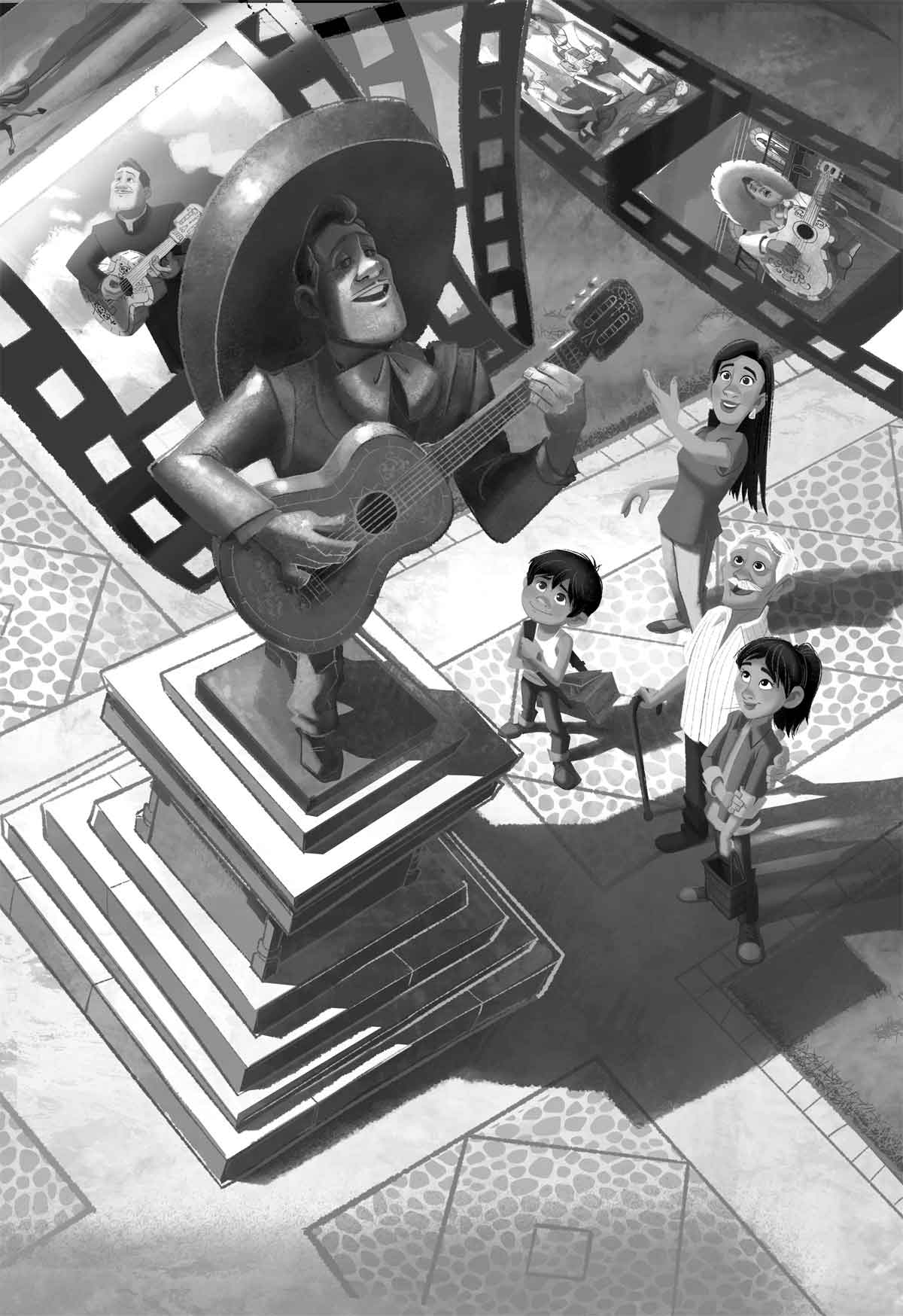






There's a sense of celebration in the air because it's the eve of Día de los Muertos, the Day of the Dead, when the community honors loved ones who have passed away. The streets are lined with strings of papel picado, squares of paper with punched-out designs, brightening the space with their pinks, greens, golds, and blues. Children reach for decorated sugar skulls. Some of the elderly, viejitos and viejitas, carry candles and vases filled with marigolds and mums for their ofrendas, while others rush to buy soda, candy, fruit, cigars, or toys to leave at the gravesites.
Meanwhile, Miguel quickly makes his way to Mariachi Plaza with Dante at his side. They finally reach their destination, and the plaza lives up to its name, for it is crowded with musicians. They're so lucky, thinks Miguel, to play guitars and trumpets without getting scolded.
“I know I'm not supposed to like music,” Miguel tells Dante, “but it's not my fault!” Miguel looks up and gazes at a statue of a handsome mariachi. “It's his: Ernesto de la Cruz, the greatest musician of all time.” At the base of the statue is a plaque with the musician's most famous quote—SEIZE YOUR MOMENT.
Just then a tour group makes its way to the statue, and Miguel eavesdrops as the tour guide tells them about the famous musician.
“And right here in this very plaza,” the tour guide says, “the young Ernesto de la Cruz took his first steps toward becoming the most beloved singer in Mexican history.”

As the guide speaks, Miguel imagines de la Cruz in his heyday, a young man in the plaza, swarmed by fans as he played his songs.
He glances down at Dante and pets him. “De la Cruz,” Miguel says, “he was just . . . he was the guy, you know? He started out a total nobody from Santa Cecilia, like me. But when he played music, he made people fall in love with him.” Dante wags his tail. Miguel's told this story a dozen times, and Dante always seems happy to hear it. “He traveled the world,” Miguel goes on. “He starred in movies. Oh, plus he had the coolest guitar. And he wrote the best songs! But my all-time favorite? It's—”
Miguel closes his eyes and recalls an old clip of de la Cruz performing in a fancy nightclub. He can clearly hear de la Cruz's voice singing his most famous song, “Remember Me.” It's a song about being remembered forever—even after one is gone. And it has a very catchy tune.
Miguel hums along with the memory. Then he looks up at the statue of Ernesto de la Cruz, awestruck by his greatness.
“He lived the kind of life you dream about,” he continues, “until 1942 . . .” He can't finish the sentence, because it breaks his heart to repeat what happened, but then he hears Dante panting and sees the goofy dog waiting for the end of the story. “Until 1942, when he was crushed by a giant bell.”
Dante barks as if to say “the end.” Then he runs off, and Miguel remembers why he's in the plaza. He's supposed to shine shoes, so he finds a spot near the statue and takes out his shoeshine kit, using the box as a footstool for his customers. A few minutes later, a mariachi asks for a shoeshine and Miguel gets to work, the whole time repeating the tale of Ernesto de la Cruz. “Sometimes, I look at de la Cruz,” he says,“and I get this feeling . . . like we're connected somehow. Like, if he could play music, maybe someday I could, too.” Then, in a voice full of sadness, he continues, “If only it wasn't for my family.”
“Ay yai yai, muchacho!” the mariachi exclaims.
“Huh?” Miguel says, confused, because for a moment, he's forgotten where he is.
“I asked for a shoeshine, not your life story,” the mariachi says.
“Oh, yeah. Sorry.”
Miguel goes back to buffing the man's shoe. Meanwhile, the mariachi plucks at his guitar strings.
“I just can't talk about any of this at home,” Miguel explains.
“Look,” the mariachi says, “if I were you? I'd march right up to my family and say, ‘Hey! I'm a musician. Deal with it.’ ” Miguel shakes his head. “I could never say that.”
“You are a musician, no?”
Miguel desperately wants to say yes, but then he remembers his family's past, how music tore them apart.
“I don't know,” he admits. “I mean . . . I only really play for myself—”
“Aah!” The mariachi seems frustrated by Miguel's lack of confidence. “Did de la Cruz become the world's best musician by hiding his sweet, sweet skills?” He doesn't let Miguel answer. “No!” the mariachi says, thumping his guitar for emphasis. “He walked out onto that plaza and he played out loud!” He points to the gazebo, where some men are setting up speakers and hanging a giant poster announcing a talent show. “Ah! ¡Mira, mira! They're setting up for tonight. The music competition for Día de los Muertos. You wanna be like your hero? You should sign up!”
Instead of excited, Miguel is shocked at the thought. “Huh-uh, my family would freak!”